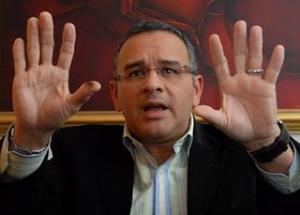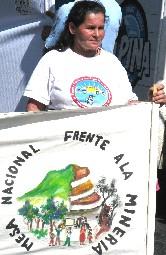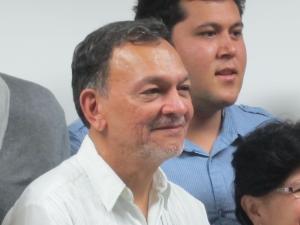President Mauricio Funes reaffirmed last week that no mining projects will be permitted in El Salvador during his presidency. Despite the great need for municipal and national revenues that such projects could generate, he stated, “I will not put the public health of the population at risk in exchange for some additional income that we might receive.”
Funes also condemned the June 3 murder of Juan Francisco Duran Ayala, the fourth anti-mining activist to be assassinated during the past two years in the department of Cabañas, epicenter of the country’s mining conflicts. He promised a thorough investigation by the Attorney General, and increased security for the anti-mining movement “because their struggle and their demands are just.”
Leaders of the National Roundtable Against Mining (the Mesa)--a coalition of community, environmental, and national non-governmental organizations that has led the anti-mining struggle—welcomed Funes’ declarations but emphasized that more concrete steps must be taken. In particular, the Mesa wants a pending law passed that would permanently ban mining in El Salvador. They note that conservative ex-president Tony Saca also declared his opposition to mining in 2008, in response to public pressure. What’s needed, they say, is a clear state policy that doesn’t simply “pass the ball” to the next elected president.
The Mesa is also critical, and highly suspicious, of a Strategic Environmental Assessment currently being conducted for the government by a Spanish consulting firm, to evaluate the costs and benefits of mining in El Salvador. Now that Funes has clarified the government’s position, they argue, the study should be scrapped. “Instead of wasting money on this consulting project,” says Francisco Pineda, a farmer who was recently awarded the Goldman Environmental Prize for his anti-mining work in Cabañas, “we should be studying how to help the communities most affected by the environmental damage [caused by mining].”
The growing resistance to mining in El Salvador has focused on Pacific Rim, a Canadian-based transnational that received an exploration permit in 2002 for a proposed massive gold mine in Cabañas, located in the basin of the country’s largest river, the Rio Lempa. A surge of permit applications by other mining companies followed, as rapidly rising gold prices and increased opportunities for private investment under CAFTA sparked intense interest in the region.
For the Mesa and its allies--including the Catholic Church, and broad sectors of civil society—the cost/ benefit analysis of these proposed mining projects is a foregone conclusion.
The Rio Lempa is one of the few remaining uncontaminated water sources in El Salvador, whose watershed extends to nearly half the country, including San Salvador. The water-intensive cyanide ore process used by mining companies like Pacific Rim could undermine rural farming and fishing economies, deplete drinking water supplies in major population centers, and cause widespread contamination from toxic runoff, leaks, or spills. The Cabañas region is also prone to earthquakes and torrential rains, which further heighten public health and safety concerns.
While Pacific Rim and other mining companies promise jobs and tax revenues to benefit affected communities and residents, the Mesa argues that most permanent jobs created by gold mining require technical skills and would likely be filled from outside the region. Under existing law, only 3% of mining profits would be paid to the Salvadoran government, for potential reinvestment in social and economic programs.
require technical skills and would likely be filled from outside the region. Under existing law, only 3% of mining profits would be paid to the Salvadoran government, for potential reinvestment in social and economic programs.
Mining has also caused social conflict and violence in communities still struggling to overcome the effects of a protracted civil war. Pacific Rim targets funds for scholarships, schools, and other benefits to municipalities (and mayors) not directly affected by mining, which creates friction with impacted communities. In addition to the four murders, dozens of mining opponents including environmental activists, priests, and local radio journalists have received death threats—which the company blames on “internal feuds” (the very same conflicts that its presence has created). The “intellectual authors” of these crimes have never been prosecuted, says the Mesa.
Faced with growing opposition from civil society—close to 2/3 of those polled in late 2007 agreed that precious metals mining should be banned in El Salvador—and even from the conservative Saca government, Pacific Rim failed to complete the technical steps required to secure a mining extraction permit. In mid-2008, the company ceased all exploratory activities.
Pacific Rim then opened a new offensive by suing the Salvadoran government for $77 million under CAFTA, alleging that investors’ rights had been violated by the government’s failure to approve an extraction permit. This extremely significant case, which is currently pending in a World Bank court, represents the first challenge to a sovereign government’s environmental policy under CAFTA. A lawsuit subsequently filed by a different transnational mining company in the same court was recently dismissed on a technicality—but only after the Salvadoran government spent $800,000 defending its claim.
The CAFTA lawsuit was clearly on the mind of Environmental Minister Herman Rosa Chávez, when he met with a delegation from the Cambridge, MA-El Salvador Sister Cities project a few days before Funes’ announcement.  According to Rosa Chávez, the Strategic Environmental Assessment will be critical in providing the foundation for the government’s new mining policy and, hopefully, a new mining law.
According to Rosa Chávez, the Strategic Environmental Assessment will be critical in providing the foundation for the government’s new mining policy and, hopefully, a new mining law.
A major goal is to insulate the government and Funes from legal challenges by Pacific Rim and other mining transnationals. With 26 currently active exploration permits (inherited from past governments) and 73 pending applications, the potential exposure is enormous. The study will also help to build consensus within the government, including the legislature, which represents a diversity of views on the mining issue.
For these reasons, says Rosa Chávez, the study must weigh alternative scenarios, ranging from selective promotion of certain types of mining to a partial or complete ban. “We are the government now,” he explains. “We have to play by the formal rules.”
Rosa Chávez himself believes that metallic mining, especially for gold, is very difficult to justify under current conditions in El Salvador. He's confident that his hand-picked blue ribbon commission charged with overseeing the study will come to the same conclusion. But he stresses that, at the end of the day, governments and public officials should never be trusted.
On that point, the Mesa is in full agreement.

